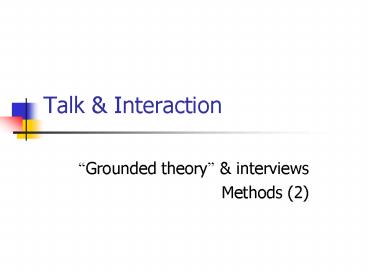Talk - PowerPoint PPT Presentation
1 / 18
Title: Talk
1
Talk Interaction
- Grounded theory interviews
- Methods (2)
2
Aims of this lecture
- Second in the series of lectures introducing
methods ie the way we actually gather the data
that will help us answer our research questions - This week focussing on primary data gathered in
words - Explore how we can interpret what research
respondents tell us to turn it into knowledge
(ie talk into text) issues of bias
subjectivity - Introduce the key issues and debates of some
talk-based research methods
3
But Im going to do an ISP, why do I need to know
how to gather primary data?
You need to know how other people have gathered
their data in order to make an informed critique!
Key point the questions that are asked,
determine the kinds of answers you will get which
determines the conclusions you make!
4
Overview of the lecture
- A grounded approach to research and the
generation of knowledge - Inductivism
- Interviewing
- Types
- Benefits and limitations
- Subjectivity and bias in research
5
Grounded theory
- Alternative to deductive approach with emphasis
on theory testing - Data first, literature later
- Limited or no hypothesis at beginning of research
- But pre-understanding? (Gummasson 1999)
- Data gathered until nothing new emerges
- Analysed by coding
- Grounded theory not a theory itself but an
approach to generating theory
6
GT in context of this unit
- Counter-balance to the gap in the literature
approach outlined in wk2 - Emphasis on close understanding of the research
context - Useful where little pre-existing literature
exists as exploratory method - eg sexual harassment of men at work
- Economics of street drug dealing
- Still need to return to the literature by theme
or code - Details beyond scope of lecture, but good intro
in Strauss, A Corbin,J (1990) Basic Qualitative
Research Grounded Theory Procedures and
Techniques. Newbury Park, Ca. Sage Publications.
7
Why interview?
- Interviews major inductive research tool
- Exploratory, grounded, data-first research
- We are conscious beings understand, define and
construct our own worlds - Different behaviours have individual meanings
need people to tell us - Cant observe meaning in the way a natural
scientist can observe a chemical reaction - Cant see through anothers eyes just by being in
their situation
8
Types of interviews
9
Structured interviews
- Interviewer works to a schedule
- Asks questions in same way to each person
usually from pre-determined sample - (see lecture 8)
- No deviation or asides allowed
- Produces standardised quantifiable data
- Statistics, generalisations, scientific method
- Reduces researcher bias
- Examples
- Flash cards, likert scales, closed questions
(watch this space!)
10
But
- Can we be sure we treat each respondent the same
way? - Inherent subjectivity of perception
- Will people be able to adequately express
themselves? - Eg can two people give the same answer but mean
different things? - How do we deal with answers that dont fit?
- Not ideal for exploring new issues
- Best suited to hypothesis testing/ deductive
research
11
Unstructured interviews
- Spontaneous conversations with whoever will talk
to you! - Links to participant observation/ ethnography
(next week) - Snowball sampling when to stop?
- Respondent allowed to talk about whatever they
like - Inductive approach to research
- Data gathered then structured later
- Coding, narrative analysis, themes
- Objectivity rejected in favour of rapport
- Emphasis on rich insightful data
- Phenomenological approach
12
But
- To what extent can a conversation be started
about nothing?! - Be explicit about agenda
- Gathering useful data, or just chatter?
- Researcher effect dont ignore
- Demographics, power issues, context etc
- Better seen as semi-structured interviews
13
Semi-structured interviews
- Guided conversations (Patton 1990)
- Areas you want to cover but will follow whats
important to respondent - Good for bounded inductivism
- Data will not be standardised but can suggest
common/ contradictory themes - Cannot generalise beyond context
14
Some types of structure
- Themes from literature
- Eg 4 ps of marketing
- Critical incident epiphany (Denzin 1997)
- Specific and/ or important incidents/ events
- Objects or people
- Storytelling (Gabriel 1999)
- Get emotionally laden data
15
Subjectivity
- Zeitgeist
- common sense (cultural) assumptions that are
often unexamined - eg capitalism seen as legitimate to earn
surplus (profit) from the labour of others - Subjectivity
- Mediated by individual psychological factors
- eg suicide bombers martyrs or terrorists?
- Positivism subjective research is not truth
- Phenomenology there is no truth, only
collective agreement about interpretations
16
Bias a positivist view
- Subjectivity to be minimised through method
- Principles of natural science
- Standardised approaches
- Controlled variables
- Experiments esp. in psychology
- Distance between researcher and respondent
- Researcher cannot influence data
- Use of numbers stats harder to misinterpret
17
Bias a phenomenological view
- All research is biased be transparent about it
- Theres no view from nowhere! or
- No truth, therefore no bias either only
interpretation - Play devils advocate examine your
assumptions - Recognise selectivity
- Be open about your methodological choices
- Use tentative language
- eg from this we could conclude that rather
than this proves that - Acknowledge other possible interpretations
- Know the limitations of your method and discuss
them
18
Summary
- Gathering data before reading literature a way of
exploring some topics - Interviews useful in this type depends on
research question - Interpretation involves recognising subjectivity
and bias however you choose to deal with it - Next week, observational methods
- Some of todays debates will apply here too so
ensure youre OK with what weve covered































